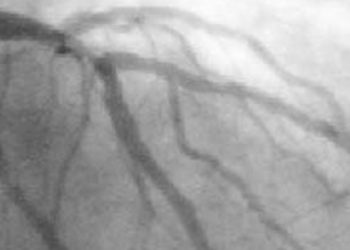Prothrombin complex concentrate noninferior to plasma infusion for patients with post-cardiopulmonary bypass coagulopathy
1. In patients with post-cardiopulmonary bypass coagulopathy, therapy with prothrombin complex concentrate was similar in overall safety and efficacy and had fewer complications compared to plasma infusion.
Evidence Rating Level: 1 (Excellent)
In surgical practice, post-cardiopulmonary bypass (CPB) coagulopathy is one of the most frequent reasons for requiring blood transfusions. Contributing factors to coagulopathies post-surgery include thrombocytopenia, platelet dysfunction, and coagulation factor consumption and dilution. Patients with factor-mediated coagulopathy and bleeding post-CPB often receive large volume plasma transfusions; however, there are many risks of plasma transfusions including lung injury, infectious complications, and allergic reactions. In recent years, the use of prothrombin complex concentrates in the treatment of coagulation factor-mediated bleeding post-cardiac surgery is becoming increasingly common due to lower risks and complications compared to plasma transfusions. As such, this randomized control trial aimed to investigate the safety and efficacy of prothrombin complex concentrate (PCC) compared to using plasma in patients undergoing cardiac surgery. A total of 100 adult participants undergoing CPB were included. Participants were randomly assigned to receive either PCC or plasma and were required to have excessive microvascular bleeding, determined by prothrombin greater than 16.6 seconds, to be included in the final analysis. Postoperative bleeding, evaluated by chest tube output, was assessed in all patients. The results of this study showed that there was no significant difference in postoperative bleeding between the PCC and plasma groups (median 937, IQR 708-1443 and median 1022, IQR 799-1575, respectively). Additionally, fewer participants in the PCC group required intraoperative transfusion after therapy compared to the plasma group (13.6% and 30.6%, respectively) and 13.6% of PCC participants avoided allogenic transfusion as opposed to 0% in those receiving plasma. In conclusion, this trial indicates that in patients receiving cardiac surgery with coagulopathic complications, PCC may be a safer and more effective alternative to plasma transfusion. Given that this is the first randomized control trial comparing PCC and plasma in this context, further research investigating efficacy and long-term adverse events could be very valuable.
Click to read the study in JAMA Surgery
Image: PD
©2022 2 Minute Medicine, Inc. All rights reserved. No works may be reproduced without expressed written consent from 2 Minute Medicine, Inc. Inquire about licensing here. No article should be construed as medical advice and is not intended as such by the authors or by 2 Minute Medicine, Inc.




![The ABCD2 score: Risk of stroke after Transient Ischemic Attack (TIA) [Classics Series]](https://www.2minutemedicine.com/wp-content/uploads/2013/05/web-cover-classics-with-logo-medicine-BW-small-jpg-75x75.jpg)

